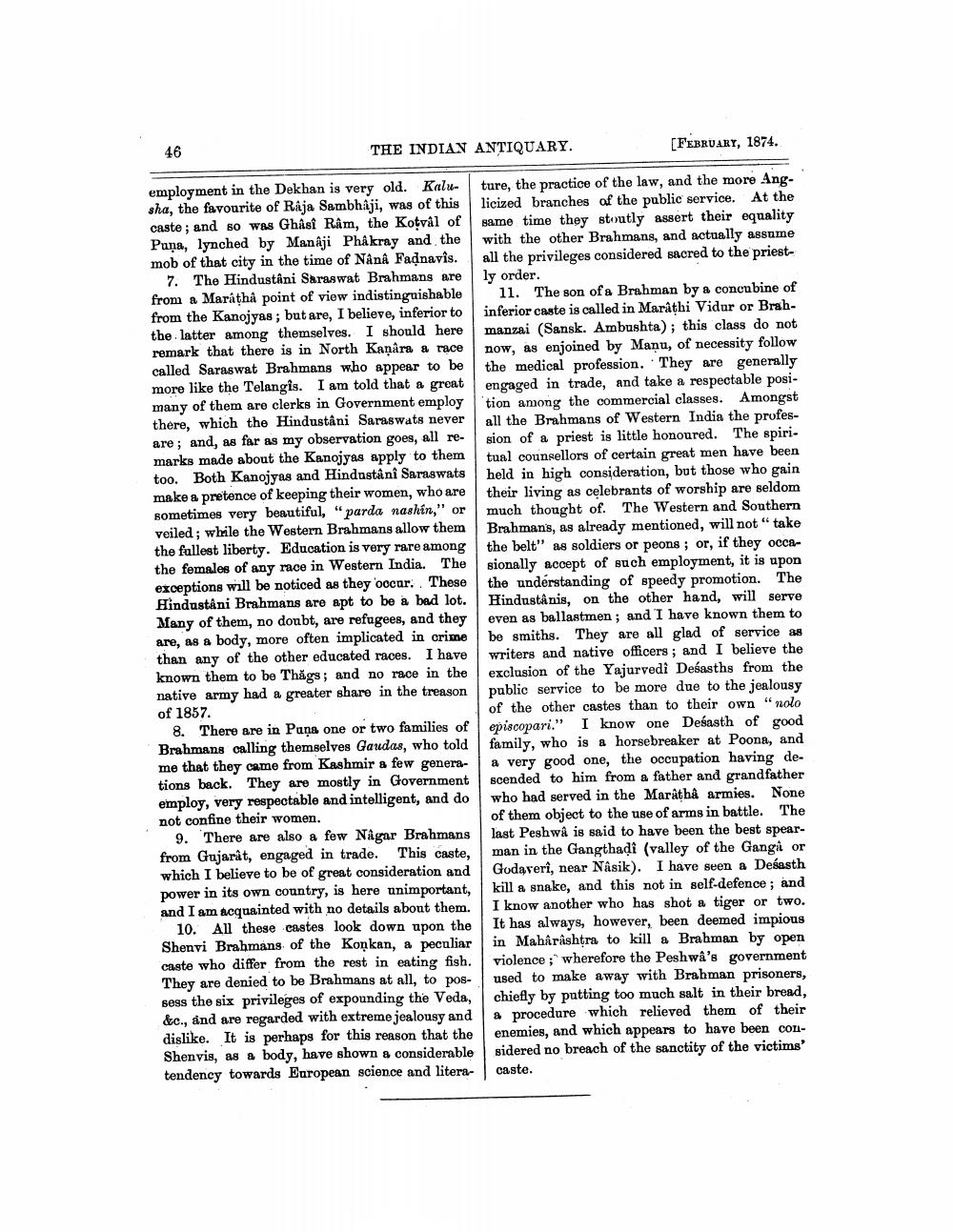________________
46
THE INDIAN ANTIQUARY.
[FEBRUARY, 1874.
employment in the Dekhan is very old. Kalu- ture, the practice of the law, and the more Angsha, the favourite of Raja Sambhaji, was of this licized branches of the public service. At the caste; and so was Ghâsî Râm, the Kotval of same time they stoutly assert their equality Paņa, lynched by Manaji Phâkray and the with the other Brahmans, and actually assume mob of that city in the time of Nana Fadnavis. all the privileges considered sacred to the priest
7. The Hindustani Saraswat Brahmans are ly order. from a Marathả point of view indistinguishable 11. The son of a Brahman by a concubine of from the Kanojyas; but are, I believe, inferior to inferior caste is called in Marathi Vidur or Brahthe latter among themselves. I should here manzai (Sansk. Ambushta); this class do not remark that there is in North Kanára a race now, as enjoined by Manu, of necessity follow called Saraswat Brahmans who appear to be the medical profession. They are generally more like the Telangis. I am told that a great engaged in trade, and take a respectable posimany of them are clerks in Government employ |tion among the commercial classes. Amongst there, which the Hindustani Saraswats never all the Brahmans of Western India the profesare; and, as far as my observation goes, all re- sion of a priest is little honoured. The spirimarks made about the Kanojyas apply to them tual counsellors of certain great men have been too. Both Kanojyas and Hindustani Saraswats held in high consideration, but those who gain make a pretence of keeping their women, who are their living as celebrants of worship are seldom sometimes very beautiful, "parda nashin," or much thought of. The Western and Southern veiled; while the Western Brahmans allow them Brahman's, as already mentioned, will not "take the fullest liberty. Education is very rare among the belt" as soldiers or peons ; or, if they occathe females of any race in Western India. The sionally accept of such employment, it is upon exceptions will be noticed as they occur. These the understanding of speedy promotion. The Hindustani Brahmans are apt to be a bad lot. Hindustanis, on the other hand, will serve Many of them, no doubt, are refugees, and they even as ballastmen; and I have known them to are, as a body, more often implicated in crime be smiths. They are all glad of service as than any of the other educated races. I have writers and native officers; and I believe the known them to be Thăgs, and no race in the exclusion of the Yajurvedi Desasths from the native army had a greater share in the treason public service to be more due to the jealousy of 1857.
of the other castes than to their own "nolo 8. There are in Puņa one or two families of episcopari." I know one Desasth of good Brahmans calling themselves Gaudas, who told family, who is a horsebreaker at Poona, and me that they came from Kashmir a few genera- a very good one, the occupation having detions back. They are mostly in Government scended to him from a father and grandfather employ, very respectable and intelligent, and do who had served in the Marathê armies. None not confine their women.
of them object to the use of arms in battle. The 9. There are also a few Någar Brahmans last Peshwa is said to have been the best spearfrom Gujarât, engaged in trade. This caste, man in the Gangthadi (valley of the Gangi or which I believe to be of great consideration and Godaveri, near Nasik). I have seen a Desasth power in its own country, is here unimportant, kill a snake, and this not in self-defence; and and I am acquainted with no details about them. I know another who has shot a tiger or two.
10. All these castes look down upon the It has always, however, been deemed impious Shenvi Brahmans of the Konkan, a peculiar in Mahârîshtra to kill a Brahman by open caste who differ from the rest in eating fish. violence ;" wherefore the Peshwa's government They are denied to be Brahmans at all, to pos- used to make away with Brahman prisoners, sess the six privileges of expounding the Veda, chiefly by putting too much salt in their bread, &c., and are regarded with extreme jealousy and a procedure which relieved them of their dislike. It is perhaps for this reason that the enemies, and which appears to have been conShenvis, as a body, have shown & considerable sidered no breach of the sanctity of the victims' tendency towards European science and litera- caste.




